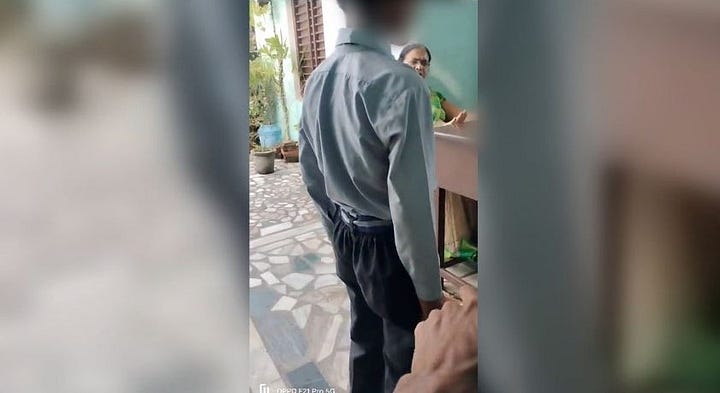
Investigation Launched in India Following Video of Teacher Encouraging Students to Harm Muslim Classmate
Authorities in India are currently probing an incident involving a teacher who was caught on video urging her students to physically harm their 7-year-old classmate, who happens to be Muslim. The incident has sparked a wave of outrage throughout the country.
The video captures the distressing scene in the Muzaffarnagar district of northern Uttar Pradesh state. In the recording, the young boy stands apprehensively in front of his peers while the teacher instructs them to strike him.
Amidst the boy’s tears, his classmates take turns slapping him, with the teacher insisting that they do so “correctly.” In the background, the sounds of the boy’s anguish are accompanied by laughter from a man witnessing the scene.
The superintendent of police for Muzaffarnagar, Satyanarayan Prajapat, stated on Friday that the teacher ordered the students to hit the boy under the pretext of him not memorizing his times tables. Additionally, Prajapat mentioned that the teacher made disparaging remarks about the boy’s religion.
According to Prajapat, the teacher reportedly remarked, “When the mothers of Mohammedan (Islamic) students fail to prioritize their children’s education, their academic performance suffers.”
Local law enforcement has taken action by filing a case against the teacher, and an ongoing investigation is in progress. As of now, formal charges have not been filed against her. District officials have also issued a directive to close the school, as reported by CNN affiliate CNN News-18.
CNN has sought further information from Uttar Pradesh police authorities regarding the incident.
The event has provoked widespread anger and distress within India, which is recognized as the world’s most populous democracy, comprising 1.4 billion citizens. The ruling Bharatiya Janata Party (BJP) has faced criticism for its Hindu nationalist policies, which many contend have exacerbated communal tensions and fostered an environment of fear and marginalization among minority communities.
Rahul Gandhi, a prominent opposition politician, condemned the teacher’s actions, accusing her of “instilling the poison of discrimination in the minds of innocent children.” Through a message on Twitter, Gandhi, now identified as X, expressed, “Transforming a place of learning like a school into a breeding ground for hatred — few actions could be more detrimental for a nation.”
Gandhi further held the BJP accountable for propagating religious intolerance. He asserted, “The same fuel being spread by the BJP has ignited flames in every corner of India. Children constitute India’s future — let’s guide them with love, collectively.”
While the BJP has yet to formally respond to Gandhi’s statements, the party has consistently maintained that it treats all citizens impartially and without prejudice. In June, during a visit to the United States, Prime Minister Narendra Modi emphasized that discrimination has no place in India.
In terms of legal provisions, Indian law lacks a specific definition for corporal punishment targeted at children. Nonetheless, physical punishment and psychological harassment are prohibited under the Right of Children to Free and Compulsory Education Act.
According to CNN News-18, the teacher asserted that the young boy’s father had requested her to discipline his child. The teacher, who identified herself as disabled, claimed that she could not directly administer the punishment, so she instructed other students to do so.
“He was brought in by his father, who asked me to correct his behavior. Given my own physical limitations, I chose a couple of students to help rectify his behavior,” she explained.
The incident transpired during a period of escalated communal tensions in India, coinciding with the BJP’s growing popularity, along with its polarizing policies. Economist Deepankar Basu’s research indicated a staggering 786% surge in hate crimes against minority groups between 2014 and 2018, following the BJP’s electoral victory.
Uttar Pradesh, the state where this incident unfolded, is India’s most populous state, housing around 200 million individuals. The region boasts a diverse religious demographic, with Muslims constituting roughly 20% of the population. Nonetheless, Uttar Pradesh remains notably divided.
Yogi Adityanath, a former Hindu monk and BJP politician serving as the state’s chief minister, has attracted criticism for his anti-Muslim rhetoric and promotion of Hindu-centric policies. The state has also introduced legislation that critics argue is rooted in “Hindutva,” the ideological foundation of Hindu nationalism.